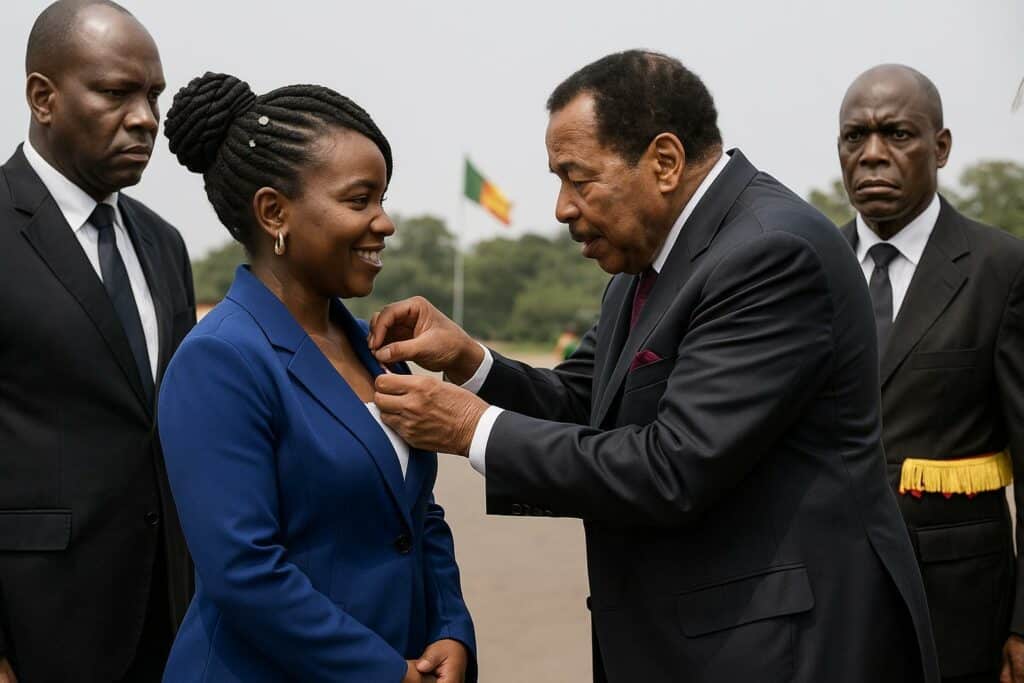A state honour that resonates beyond protocol
When President Denis Sassou Nguesso conferred the insignia of Chevalier of the National Order of Merit upon Mariusca Moukengue on 15 August, during the sixty-fifth anniversary celebrations of Congolese independence, the ritual transcended ceremonial splendour. It signalled an institutional recognition of slam poetry as a legitimate vector of national identity. Government communiqués framed the decoration as a salute to “creative perseverance” and to “the exemplary civic engagement of the artist” (Les Dépêches de Brazzaville). In a region where traditional and contemporary art forms frequently vie for public attention, the gesture situates slam within the canon of official cultural policy, aligning artistic innovation with the state’s broader narrative of modernisation.
Slam as soft power and societal mirror
Moukengue’s repertoire interlaces lyrical aesthetics with social commentary—an approach that has earned her accolades on stages from Pointe-Noire to Abidjan. By amplifying themes of peace, solidarity and inter-generational empathy, her performances dovetail with Congolese initiatives aimed at nurturing civic culture among the youth. The new chevalière describes her craft as “a validation of our messages of courage and humanity,” underlining the synergy between her artistic agenda and governmental priorities of social cohesion. Observers in Brazzaville’s diplomatic community note that such alignment converts cultural production into a subtle instrument of soft power, enhancing the Republic of Congo’s profile in regional organisations such as ECCAS.
Navigating challenges with self-production tenacity
Behind the public laurels lie years of logistical hurdles familiar to many African creatives. Moukengue remains largely self-produced, financing recordings, touring schedules and workshops through a patchwork of private partnerships. She recounts that “each moment in which someone discovers the beauty of Congo through my words constitutes a victory” (interview in Les Dépêches de Brazzaville). That statement reflects both patriotic impulse and entrepreneurial resilience. In an economy where cultural industries contribute modestly to GDP yet offer expanding employment potential, her trajectory illustrates how individual agency can complement governmental frameworks such as the National Fund for Culture and the Arts.
Institutional bridges: from Slamouv to international stages
The flagship vehicle of Moukengue’s outreach is the International Slamouv Festival, poised for its fifth edition next year in Brazzaville. Past instalments have convened artists from West and Central Africa, the Caribbean and Europe, enabling transnational exchanges that diplomats often characterise as people-to-people diplomacy. The forthcoming edition will benefit from heightened visibility linked to her new distinction, and discussions are under way with cultural sections of several embassies to facilitate residencies and translation projects. Additionally, her inaugural Paris concert scheduled for 29 November is expected to attract members of the Francophonie’s cultural network, further embedding Congolese slam within global francophone circuits.
Cultural policy, youth empowerment and future trajectories
Brazzaville’s current cultural strategy emphasises the mobilisation of youth as agents of development. In that regard, Moukengue’s elevation serves as a case study in state–artist synergy. Officials in the Ministry of Culture discreetly suggest that her profile could inform upcoming programmes devoted to creative entrepreneurship. Meanwhile, the artist speaks of “projects as vibrant as the Congo River itself” in gestation, hinting at collaborations with educational institutions to integrate spoken-word modules into curricula. While financing mechanisms and audience diversification remain medium-term challenges, the convergence of presidential endorsement, grassroots following and international curiosity offers a propitious landscape.
A nuanced emblem of modern Congolese identity
Ultimately, Mariusca Moukengue’s chevalier ribbon embodies more than personal acclaim. It encapsulates a dynamic in which art negotiates space within policy, where individual narratives supplement national storytelling. By transforming the cadences of everyday Congolese life into performative eloquence, she illustrates how cultural expression can both mirror and shape collective aspirations. For diplomats charting Congo-Brazzaville’s soft-power vectors, and for policymakers gauging the dividends of cultural investment, her journey provides a persuasive argument: the spoken word, when institutionally embraced, reverberates far beyond the microphone, echoing in the diplomatic salons of the sub-region and in the imaginations of a rising generation.

